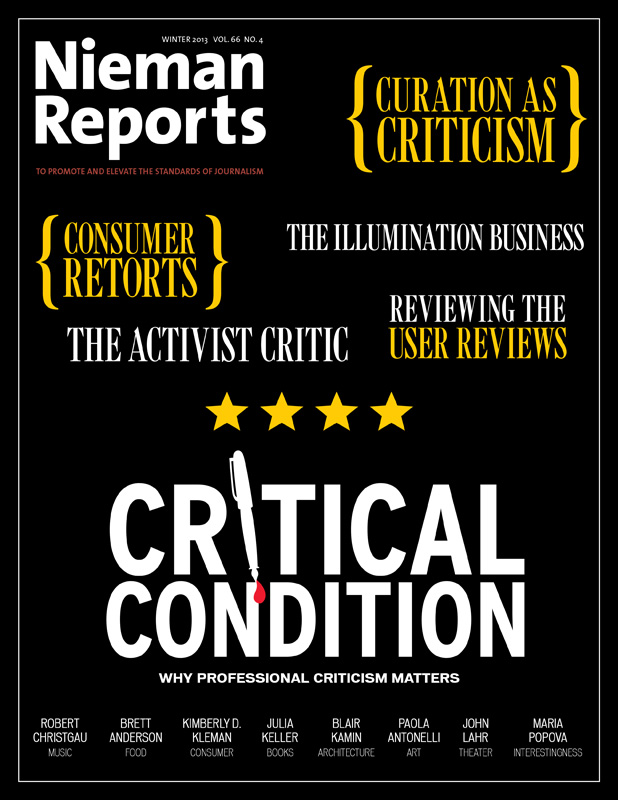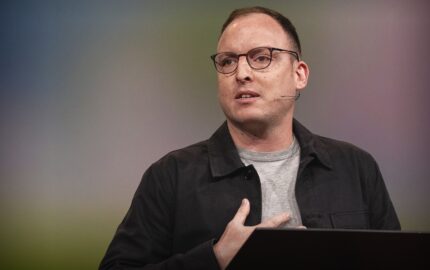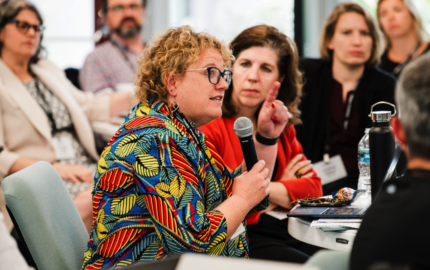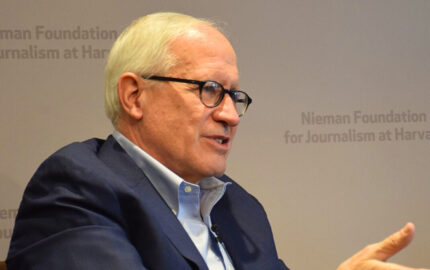
Errol Morris, who once worked as a private detective, has a reputation for being relentless in his search for truth. His investigation into the murder of a Dallas police officer for his 1988 film "The Thin Blue Line" led to the release of the man who had been convicted and sentenced to death. In his new book "A Wilderness of Error," Morris takes on the infamous trial of Jeffrey MacDonald for the 1970 murder of his wife and two daughters. MacDonald, who has long maintained his innocence, was found guilty after more than a decade of trials and appeals. He is currently serving three life sentences. Morris believes MacDonald is innocent and didn't get a fair trial, though he concedes that it may be impossible—given the passage of time and the shortcomings of the police investigation—to prove his innocence at this point. Morris spoke at the Nieman Foundation with Jennifer B. McDonald, NF '13, an editor at The New York Times Book Review. Edited excerpts of his remarks:
I wrote a book about error, basically. Not just the fact of error, but how errors are made, how they're propagated, how they're enforced. That's what makes the book interesting to me: How people really are error-generating machines.
The title comes from Edgar Allan Poe's short story "William Wilson." There's a line in there that I have always loved. I'm not even sure I understand what it means—Poe was a little crazy—but at one point his character says that he was seeking an "oasis of fatality amid a wilderness of error." And in the “ Civilization is made possible by the fact that we withhold things from other people.” context of this book, it's looking for something that seems real, factual and true in this sea of confusion, falsehood and error.
People often become confused about the difficulty of finding something out and the impossibility of finding it out. Some things are really, really, really, really hard to determine, and maybe you fail. Doesn't mean that there isn't something there to uncover or to pin down.
My experience with investigations is you don't even know what you're investigating half the time. Being good at it is really being bad at it; it's not knowing a lot of what you're looking for, but being open to finding something out.
We are constantly creating narratives, but we should remember that narratives can be shown to be false. The world always trumps whatever story we can concoct for ourselves.
Our justice system works because of competing narratives. You have the prosecution. You have the defense. If they're any good at what they do, they're creating stories about guilt or innocence. Lost in all of that is: What is the evidence? How did this person end up where they are? What kind of a net did they fall into?
If you want to believe in a certain narrative, you stop looking at evidence. Somehow narratives close off our access to the world. So you put the world at arm's length.
In Jeffrey MacDonald's case, there was a very powerful narrative created around him by Joe McGinniss's book "Fatal Vision," by the TV mini-series "Fatal Vision," by the "60 Minutes" episode with Mike Wallace. It's almost like a perfect storm. Everything sort of coalesced around the idea that he was guilty, that he was a psychopath who had wantonly, brutally slaughtered his family and then was trying to dig his way out of it.
Everything ... feeds off everything else. In fact, we don't even really know anymore where our information comes from. I sometimes think that when natural selection produced our brains, there weren't pigeonholes for 'I read this in the National Enquirer' or 'I heard this on Fox News' or 'I read this in The New York Times' or 'I heard this from a friend.' We are awash in this sea of information, and often it's impossible, at least for me, to remember where a lot of it came from. I wonder what effect ultimately this will have on places like The New York Times, because at least, for better or for worse, you know it's The New York Times. Not that it's infallible, but at least it's something.
Do you always tell people, not just as a journalist, but under any set of circumstances, everything that's on your mind? Human discourse would be impossible under those circumstances. Civilization is made possible by the fact that we withhold things from other people.
But why does anybody talk to anybody else? Talking to other people, properly considered, is ill-advised.
Say there was a lockbox in which all of the evidence from the Battle of Hastings was contained, and that lockbox was destroyed. Could you say that we could never know anything about the Battle of Hastings? No you couldn't, because you could always find another lockbox that you don't know about. There's always more stuff out there, and we always have the luxury of going after it.
Maybe in getting at the truth, the best thing is to show how you got at it, or how you tried to get at it—to leave your investigation available to others, the process by which you arrived at certain kinds of conclusions or accepted certain kinds of beliefs. That's the idea behind "A Wilderness of Error."
Now, I wrote a book about a case that's 42 years old. That's a weird thing to do in and of itself, because we're talking about a case that's on the edge of history. The people who were involved are dying off, people have changed their stories, memories have changed. I don't know if I could ever get closure on this. But I can prove that there's no strong case against him.
I don't care whether the story is distributed to 100 million people or 100 billion people or 100 trillion people, because truth is not about what the majority believes. Truth is truth. The 100 million, 100 billion, 100 trillion people could be—what's the technical term?—wrong.



